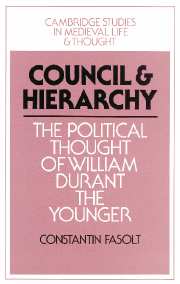Book contents
- Frontmatter
- Contents
- Acknowledgments
- List of abbreviations
- List of manuscript sigla
- INTRODUCTION
- PART I THE FORMATION OF INTEREST
- PART II THE ASSERTION OF JUSTICE
- 4 THE THEORY OF REFORM
- 5 ‘MAGNUS ORDO DIFFERENTIE’
- 6 ‘RES PUBLICA’
- 7 THE PERVERSION OF ORDER
- RESULTS: LIBERTY AND LAW
- PART III THE INCIDENCE OF POWER
- CONCLUSION
- Appendix: A note on texts and citations
- Bibliography
- Concordance
- Index
- Cambridge studies in medieval life and thought Fourth series
4 - THE THEORY OF REFORM
Published online by Cambridge University Press: 06 July 2010
- Frontmatter
- Contents
- Acknowledgments
- List of abbreviations
- List of manuscript sigla
- INTRODUCTION
- PART I THE FORMATION OF INTEREST
- PART II THE ASSERTION OF JUSTICE
- 4 THE THEORY OF REFORM
- 5 ‘MAGNUS ORDO DIFFERENTIE’
- 6 ‘RES PUBLICA’
- 7 THE PERVERSION OF ORDER
- RESULTS: LIBERTY AND LAW
- PART III THE INCIDENCE OF POWER
- CONCLUSION
- Appendix: A note on texts and citations
- Bibliography
- Concordance
- Index
- Cambridge studies in medieval life and thought Fourth series
Summary
I read the constitutions for the state of the universal church which the holy fathers, general and provincial councils, and others carefully established once upon a time, which we have abandoned in many ways, and I decided to write down what in my humble view ought to be done by the council that is going to meet in Vienne.
William DurantEver since the Colonna cardinals had turned against Pope Boniface VIII, the call for a general council had been in the air. For years the papacy had successfully stalled. But the arrest of the Templars in 1307 raised the stakes to a point at which the tactics of delay proved ineffective. In August 1308 Pope Clement V convoked a general council in the city of Vienne.
From Clement's point of view, the most important business at hand undoubtedly was to decide the fate of the Templars and to put an end to the damage stemming from the clash between Philip IV and Boniface VIII. But general councils were more than ad hoc assemblies convened to deal with specific short-term problems, however urgent: they provided an occasion to promote large-scale reform of the church as well. Hence Clement asked the prelates in his bull of convocation ‘carefully to investigate whatever requires honing through correction and reform, either in person or with the help of prudent men who fear God and who are well informed.
- Type
- Chapter
- Information
- Council and HierarchyThe Political Thought of William Durant the Younger, pp. 115 - 176Publisher: Cambridge University PressPrint publication year: 1991



